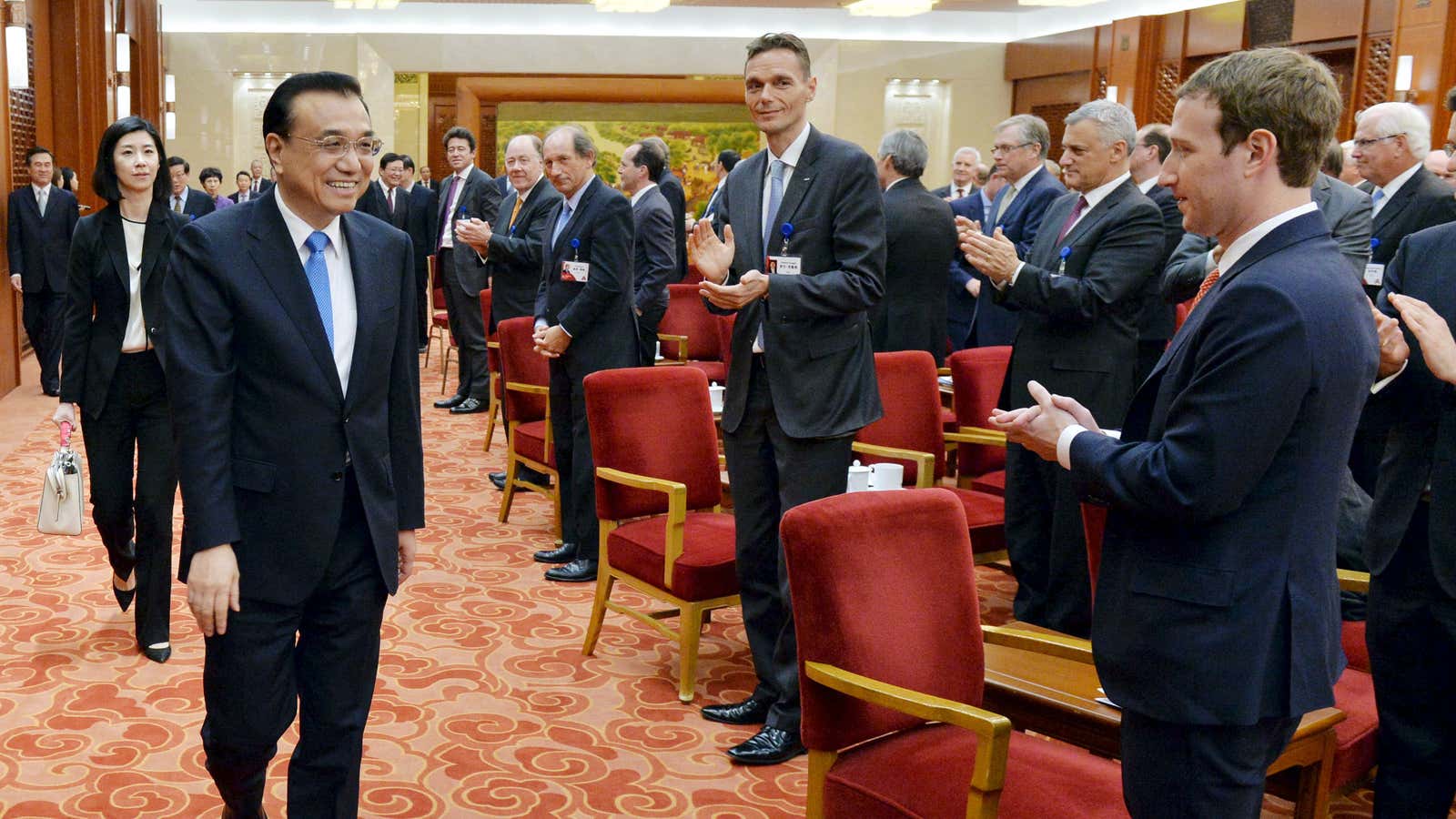On Nov. 23, The New York Times reported that Facebook was internally developing a tool that would censor content in the News Feed, in an effort to re-enter the one massive market beyond its reach so far—China.
The discovery illustrates the lengths Facebook is willing to go to return to the Middle Kingdom, and the timing proved telling. Just as CEO Mark Zuckerberg was publicly arguing the company ought not to become the “arbiter of truth” and censor fake news, employees were building tools to censor far more for China.
Facebook would not be the first foreign tech company to make concessions to the Chinese government in exchange for market access, but it would be the most important one to date. And despite the allure of hundreds of millions of new users, the real winner of a Facebook entry into China wouldn’t be the social media giant or even consumers—it would be the Chinese government, and its vision for an “open” internet.
Stiff competition
Facebook’s desire to enter China is understandable from a business perspective. Starting in 2009, the social media site has been blocked in China by the Great Firewall—the name used to describe a system wherein users attempting to reach certain websites are re-directed to bogus IP addresses. Since then it has amassed 1.8 billion monthly active users, hailing from nearly everywhere except China. Growth in new users is healthy, but has begun to slow. China, meanwhile, is home to an estimated 721 million internet users, most of whom have likely never registered for Facebook. The country marks an untapped well of potential users.
Yet succeeding in China isn’t as simple as just showing up. By now, China’s internet industry has plenty of social networks that would compete directly with Facebook. Weibo, which has nearly 300 million monthly active users, roughly substitutes Twitter as a source for real-time information. WeChat, with 846 million monthly active users, is the country’s chat app of choice. It also works as a news-reading app, a shopping portal, and a digital rolodex. Zhihu is China’s answer to Quora. Baidu Tieba recalls the anarchy of Reddit. Almost every major internet service based in the US has one or several counterparts in China.
There’s little reason for most Chinese consumers to be excited about Facebook, other than perhaps to connect with friends abroad. One Chinese internet user told Quartz the only reason for her to use Facebook was to troll public figures she perceived as anti-China, like Taiwan president Tsai Ing-wen. “Social networks are about making friends, and none of my friends are on Facebook, so I’ve never had to jump the firewall,” she said at the time.
As a result, an entry into China is unlikely to boost Facebook’s bottom line all that much and comes with significant risks. As blogger Ben Thompson points out (paywall), entering China will introduce new pressure from shareholders for Facebook to succeed there, and other large tech companies have seen their China dreams go unrealized. Uber reportedly burnt through $2 billion in China before bowing out by striking a deal with its competitor Didi Chuxing. Apple’s share price, meanwhile, hit a trough after it reported its first-ever annual sales decline in China, though it has since recovered. Investors will likely have little tolerance for an indifferent reception to Facebook in China—but that’s a likely outcome. While gaining access to millions of potential new users is hugely tempting, winning them over and profiting from them will not be easy.
You, me, and the CCP
While it doesn’t appear Facebook or Chinese consumers stand to benefit all that much, getting Facebook to cede control of its core product would be a major victory for the Chinese government, and the Communist Party of China (CCP).
China often describes its internet industry as “open.” But, in practice, that’s far from the case. The CCP has made it clear—through laws and practice—that doing business inside China requires heeding to its demands. Foreign companies have to navigate through a web of regulations, licenses, and political relationships simply to stay in business. In turn, domestic companies more familiar with China’s bureaucracy and less burdened by a foreign passport often end up leading the market.
Increasingly, foreign companies are losing their patience. Google closed its consumer-facing search engine in 2010, following years of tensions with authorities caused by pressure to censor search results. IBM, Intel, and Microsoft are discreetly pushing for the US government to exert more pressure on Beijing, which they claim is pressuring them to hand over data and source code. Uber’s exit came just before a broader crackdown on ride-hailing services. Netflix wrote off China one year after it first announced plans to arrive there.
Facebook, however, will be subject to more political pressure than any of those companies. That’s because it deals in information—not just its search and discovery (like Google), but its spread. It’s the sort of service that can ferment a revolution, or turn an election. For this reason, compliance with China’s censorship regime, which already exerts tremendous influence on its domestic social networks, is a prerequisite for getting into China.
As a result, Facebook stands to become a trophy for Beijing and the CCP if it enters China by offering up censorship tools or some similar concession. The government would maintain its facade of openness by allowing in a powerful foreign company, while also seeing its vast censorship regime legitimized. Facebook’s entrance could also lead other foreign media companies to similarly conclude that the benefits of doing business in China outweigh the ethical costs, and, if not, they would risk falling further behind their imposing rival. Most importantly, China’s internet authorities will have proven that the only way to enter the country will be on their terms.
